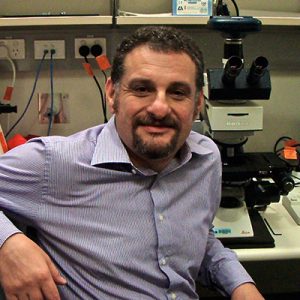
The T-cell is an immune cell that causes damage to brain cells in MS. For these cells to get into the brain they need to be turned on by another immune cell known as the dendritic cell. The interaction between the T-cell and the dendritic cell controls whether the T-cell goes on to help the brain recover or injure the brain. By understanding both where and how the helpful and harmful T-cells are made, it will become possible to change this process to make more helpful T-cells.
Dr Brown’s research has identified that the interaction between dendritic cells and T-cells takes place outside the brain, in the cervical lymph nodes in the neck. This is important since the location of the cervical lymph nodes outside the central nervous system provides a potential site for therapy, and medications delivered directly to these sites would be likely to have fewer side effects, and may have the potential to reduce or eliminate MS relapses.
Using laboratory models of MS which are either prone or resistant to disease, Dr Brown has characterised the interaction of dendritic cells and T-cells at the cervical lymph node sites. He has shown that when a specific protein is activated in dendritic cells, the balance between the harmful T-cells and the helpful T-cells is changed and more harmful T-cells are produced. Switching off the protein in the dendritic cells altered the balance away from the harmful T-cells and reduced disease severity.
The next stage of this project showed that therapeutic intervention, via injection of these immuno-suppressive dendritic cells directly into the cervical lymph nodes of mice, was able to modify the disease process and suppressed the anti-CNS immune response. By showing that cells can be selectively delivered to the cervical lymph node and successfully suppress anti-CNS immune responses, this constitutes a proof of concept of therapeutically targeting the cervical lymph nodes in MS.
These findings confirm that an immunomodulatory dendritic cell subset exists, which is very novel data. Future research aims to characterise this subset of cells more finely, which will provide the highest chance to gain therapeutic insights into MS disease. This will hopefully eventually identify novel therapeutic strategies and targets.
Updated: 30 June 2014
Updated: 06 January, 2011

